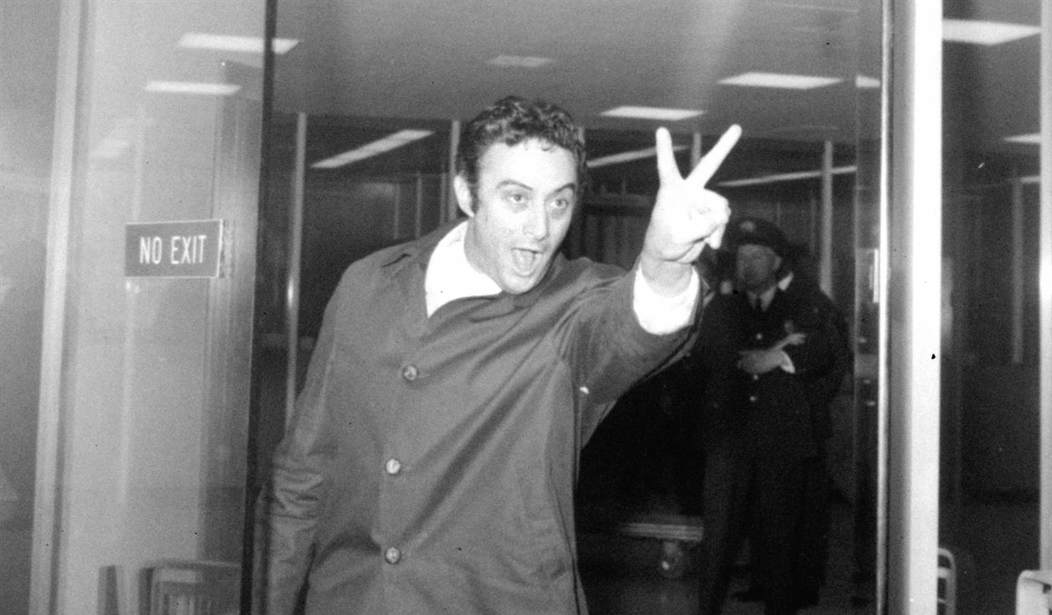On first impression, Lenny Bruce is few people’s idea of a hero. He was a drug addict, a self-admitted con artist, and was far more at home in a strip club than in a place of worship. At the peak of his comedy career in the early 1960s, critics labeled his brand of humor “sick.” Captain America, he was not. But in the 54 years since his untimely death, Lenny Bruce has routinely been hailed as a trailblazer of comedy and a free-speech pioneer. He was idolized by no less a comedic genius than George Carlin. At a time when the powers-that-be sought to limit the scope of acceptable discourse, Lenny fought until his last breath for the right to challenge orthodoxy.
With the principle of free speech under constant assault today, we have to travel back to Lenny Bruce’s era to find the most recent time when this fundamental liberty faced such an uphill battle in America.
The most significant threats to free speech are always posed by those who control the culture. In Lenny’s day, it was supporters of institutions such as the Catholic Church that used the force of government to shut critics down. Today, it is universities; social-media mobs; and—in a dark, unfortunate irony – a number of mainstream media publications that are trying to enforce a particular notion of acceptable speech.
To a comedian like Lenny Bruce, it was inconceivable that words spoken on stage – words that neither advocated violence nor posed a direct threat to any individual – could be deemed unlawful. Despite the looming specter of legal action, Lenny continued to perform his act, mocking the powerful and regularly addressing racial and sexual taboos. Eventually, Lenny was arrested for obscenity in San Francisco. And Chicago. And Los Angeles. And New York. Fighting these legal battles took a toll on Lenny and left him bankrupt and broken.
On my podcast this week, I had the honor of interviewing legal scholars Ron Collins and David Skover, who wrote the seminal book on Lenny Bruce’s legal escapades. As Collins and Skover tell it, Lenny was uniquely dedicated to the idea that no topic was off-limits on stage. At a time when other major comedians focused on family-friendly material or light political ribbing, Lenny was more interested in discussing the hypocrisies he saw in society. Because of this irreverent attitude, Lenny was pursued relentlessly by the authorities.
Recommended
Lenny’s lawyers begged him to follow their advice–to plead the Fifth and prevent himself from self-incriminating, to let the lawyers do the talking, to simply dress well for court. Lenny, whose naivety about the justice system could be described simultaneously as endearing and baffling, refused much of his counsel’s advice. Lenny didn’t want to win his cases on some legal technicality. Instead, he wanted to perform his act in court and have the judges and juries rule based solely on the content of his performance. “I respect the law, and it will eventually vindicate me,” Lenny once said. Lenny went so far as to fire his lawyers and represent himself–to disastrous results.
Lenny died of a drug overdose shortly after being convicted in New York. But he left a legacy that far outlasted his lifetime. For decades, America saw an expansion of free speech. Numerous court rulings strengthened the protections of the First Amendment. Collins and Skover were even able to have Lenny posthumously pardoned for his conviction in New York.
In America today, the idea of someone being sent to prison simply for telling jokes sounds preposterous. But while the First Amendment protects us from government prosecution, Americans who go against the grain of the cultural zeitgeist face virulent persecution from their fellow citizens. Many have succumbed to the pressure of online mobs and apologized for the slightest missteps. Episodes of multiple TV shows have been removed from air because they have retroactively been deemed “controversial.”
In a time of global pandemic, these issues may seem insignificant. Surely, we have bigger problems to worry about than calls for a boycott of Trader Joe’s over the grocer’s humorous labeling. But these seemingly minor cultural issues, when ignored for too long, become part of our law. The culture of the 60s shifted dramatically in favor of free speech–in no small part, certainly, thanks to Lenny Bruce. That shift was so dramatic, in fact, that when Lenny’s New York prosecutor ran for District Attorney just several years after Lenny’s conviction, the prosecutor’s victory over Lenny was considered his greatest liability as a candidate. No comedian since Lenny Bruce has been convicted of obscenity for performing in a club. The open speech that was once tolerated only in dive bars and strip clubs soon became a protected right that was enshrined in law by the Supreme Court.
Today, we are at a time when the cultural pendulum is swinging away from free expression. If we continue down this path, it is inevitable that the government itself will begin enforcing the speech codes that have become all too prevalent in other areas of our society. While some tastemakers are becoming aware of the dangers of the current state of speech, it will take more people with the courage and sickness of Lenny Bruce to reverse this restrictive trend.

























Join the conversation as a VIP Member